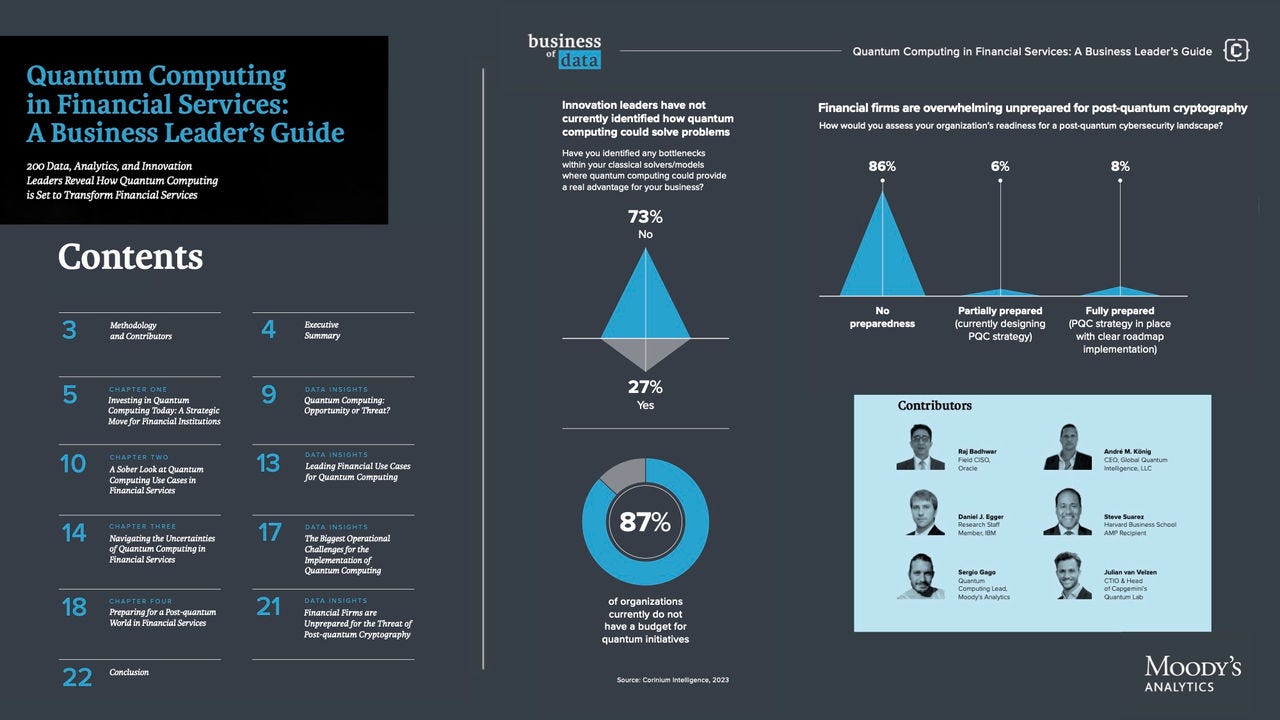The Week in Quantum Computing - June 5th
Issue #139
The Week in Quantum Computing. Brought to you by Sergio Gago (@piratecto).
What Happened this week?
China has emerged keeps its position as a front-runner with its unveiling of a new generation quantum computing cloud platform and the deployment of a 176-qubit quantum computing platform, Zuchongzhi. This complements their major financial commitment, with China Telecom investing 3 billion yuan ($434 million) to establish the China Telecom Quantum Information Technology Group. Meanwhile, Quantum Machines and ParTec have broken new ground with QBridge, a universal software solution integrating quantum computers into high-performance computing environments, its first installation scheduled at the Israeli Quantum Computing Center later this year.
In terms of quantum research and education, the University of Michigan has committed a hefty $55 million to launch a multidisciplinary Quantum Research Institute, while K-12 schools are urged to incorporate quantum computing education to address the looming IT skills gap. A new McKinsey report highlights that a third of jobs in the field remain vacant, reinforcing the urgent need for quantum training. Multinational bank HSBC has joined hands with Quantinuum, the world's largest quantum computing company, to explore quantum applications in financial services such as cybersecurity and fraud detection. As the quantum landscape continues to evolve, it is expected that quantum computers will become mainstream by 2030, as noted by 59% of Canadian organizations surveyed by KPMG. However, it also underlines the need for increased investment to reap the benefits and manage the risks of this rapidly advancing technology.
Talking about Finance and Quantum… 200 Data, Analytics, and Innovation Leaders Reveal How Quantum Computing is Set to Transform Financial Services
Are companies really investing in Quantum? Well, 73% of financial leaders have not identified bottlenecks or problems to use with QCs and as such, 87% of companies are not budgetting for is. Why? Read it in the Moody’s Analytics report :
» Download the Free Report
Quick Recap
Next Events
Playing with Fire to improve QAOA
The Quantum Approximate Optimization Algorithm (QAOA) is a popular hybrid quantum-classical algorithm applicable to a range of optimization problems currently out of reach for enterprises, like financial portfolio optimization, efficient logistics routing, and asset-liability management.
Implementing QAOA is complicated. Once you've set up the problem, configuration requires a deep understanding of both conventional optimization and physics. Then when you run it on a device, you'll rarely get an answer better than random selection. The figure below plots the probability of the quantum computer outputting a correct solution to a problem. The ideal plot of probabilities is shown in the top graph, and the bottom graph transitions between the results obtained from the default benchmark and those obtained using Fire Opal. The plot shows that when you run QAOA with the default benchmark, the probabilities of all solutions are the same and QAOA isn’t giving any useful output! On the other hand, the Fire-Opal-boosted performance looks almost the same as the ideal plot.
Fire Opal’s error-suppressing QAOA solver alleviates the complexity and challenge of running QAOA by providing an easy-to-use function that consistently returns the correct answer. If you’re interested in running QAOA for your optimization problems on real hardware, Fire Opal is the best way to get meaningful insights from your problem. Try it free today!
Link: https://docs.q-ctrl.com/fire-opal/tutorials/solving-maxcut-using-fire-opal
Thanks for reading Quantum Pirates! Subscribe for free to receive new posts and support my work.
The Week in Quantum Computing
Quantum computing and the IT gap
Quantum computing is expected to become a functioning reality within a generation, with many leading companies predicting it will be an adoptable technology by 2030. […] given that there’s a pre-existing IT skills gap, will companies be ready to make the most of early adoption of quantum computing as and when it arrives? And if not, how can they get ready for it, technically before the “finished product” of a fully operating fault-tolerant quantum computer is available to test? We sat down with Scott Bucholz, Global Quantum Lead at Deloitte Consulting, to crunch the numbers on quantum computing and the IT gap
Link: https://ift.tt/tsTIxiV
May 28, 2023 at 09:30PM
China unveils new quantum computing cloud platform
BEIJING -- China released a new generation of a quantum computing cloud platform, which enables researchers to perform complex computational tasks in the cloud and the public to experience quantum computing at the speed of microseconds.
Link: https://ift.tt/hrC3KiI
May 28, 2023 at 10:30PM
Quantum Machines and ParTec Unveil QBridge, a Universal Software Solution for Quantum-HPC Integration
TEL AVIV, Israel and MUNICH, May 17, 2023 — Quantum Machines and ParTec have announced a co-developed universal software solution for the tight integration of quantum computers into high-performance computing (HPC) environments. QBridge is a first-of-its-kind commercially available solution that enables multiple HPC users to seamlessly execute hybrid workflows across HPC-classical and quantum computing resources. This advancement is a key requirement and a major step towards achieving quantum advantage. The first installation of the solution will be at the Israeli Quantum Computing Center (QCC) during the second half of 2023.
Link: https://ift.tt/NP2AJ6d
May 28, 2023 at 10:30PM
U-M launches institute to accelerate quantum research, education
From the atomic clocks that power GPS navigation to MRI scans that detect cancerous tumors, fundamental advancements in quantum engineering, science and technology continue to revolutionize how the world operates. To solve global quantum challenges and prepare a next-generation workforce to catalyze new discoveries, the University of Michigan will invest $55 million to launch a multidisciplinary Quantum Research Institute and recruit up to eight new faculty members with expertise in quantum.
Link: https://ift.tt/16HNIS2
May 29, 2023 at 05:30PM
Researchers develop 'noise-canceling' qubits to minimize errors in quantum computers
In a new paper in Science, researchers in the lab of Asst. Prof. Hannes Bernien at the University of Chicago's Pritzker School of Molecular Engineering describe a method to constantly monitor the noise around a quantum system and adjust the qubits, in real-time, to minimize error.
Link: https://ift.tt/mUMYP4n
May 30, 2023 at 08:30AM
HSBC and Quantinuum Explore Real World Use Cases of Quantum Computing in Financial Services
Multi-stage project by Quantinuum and HSBC will research several quantum topic areas, including cybersecurity, fraud detection, and natural language processing CAMBRIDGE, UK, BROOMFIELD, CO, May 30th, 2023 – Quantinuum, the world’s largest quantum computing company, and HSBC are pleased to annou
Link: https://ift.tt/X8b35t4
May 30, 2023 at 05:30PM
Quantum sensors could detect space debris from its gravitational pull
Sensors based on the quantum behaviour of tiny crystals could detect pieces of space debris hurtling towards satellites.
The US government estimates that there are around half a million pieces of debris between 1 and 10 centimetres across, like chips from defunct satellites and rocket fragments, orbiting Earth. Some bits of space junk are tracked from the ground with radar, but as the number of satellites in orbit grows, so does the need for …
Link: https://ift.tt/NyKwsBG
May 31, 2023 at 07:30PM
Direct manipulation of a superconducting spin qubit strongly coupled to a transmon qubit
Spin qubits in semiconductors are a promising platform for producing highly scalable quantum computing devices. However, it is difficult to realize multiqubit interactions over extended distances. Superconducting spin qubits provide an alternative by encoding a qubit in the spin degree of freedom of an Andreev level. These Andreev spin qubits have an intrinsic spin–supercurrent coupling that enables the use of recent advances in circuit quantum electrodynamics. The first realization of an Andreev spin qubit encoded the qubit in the excited states of a semiconducting weak link, leading to frequent decay out of the computational subspace. Additionally, rapid qubit manipulation was hindered by the need for indirect Raman transitions. Here we use an electrostatically defined quantum dot Josephson junction with large charging energy, which leads to a spin-split doublet ground state. We tune the qubit frequency over a frequency range of 10 GHz using a magnetic field, which also enables us to investigate the qubit performance using direct spin manipulation. An all-electric microwave drive produces Rabi frequencies exceeding 200 MHz.
Link: https://ift.tt/u1nbQms
May 31, 2023 at 07:30PM
Why K-12 Schools Must Invest in Teaching Quantum Computing Today
While the field is still developing, the White House is working with the National Science Foundation to get quantum learning materials to K-12 schools. Educators in Ohio and Texas have made this subject a high priority for K–12. […] Educators and scientists say K-12 students must be exposed to quantum information science at an early age to prepare them for advanced math and science in college and, later, for careers in related fields. This step is particularly pressing as McKinsey notes that a third of jobs in the field remain vacant.
Link: https://ift.tt/pykxRWl
June 01, 2023 at 09:30AM
Canadian organizations expect quantum computing to be mainstream by the end of the decade but most need to step up investment to harness benefits and manage risk : KPMG
TORONTO, /CNW/ - Six in 10 (59 per cent) Canadian organizations expect quantum computers – capable of solving problems exponentially faster than ordinary computers - to become mainstream by 2030, finds new research from KPMG in Canada.
Link: https://ift.tt/FO6TGjn
June 01, 2023 at 09:30AM
China Telecom establishes quantum technology group
SHANGHAI, May 31 (Reuters) - China Telecom (0728.HK) has invested 3 billion yuan ($434 million) to establish the China Telecom Quantum Information Technology Group Co., it said in a statement on its official WeChat account Tuesday.
Link: https://ift.tt/CXdOWK8
June 01, 2023 at 09:30AM
China's 176-qubit quantum computing platform goes online
A 176-qubit quantum computing platform named Zuchongzhi went online for global users Wednesday night, which is expected to push forward the development of quantum computing hardware and its ecosystem, according to the Center for Excellence in Quantum Information and Quantum Physics under the Chinese
Link: https://ift.tt/i0u48L3
June 02, 2023 at 12:33AM
IonQ Demonstrates World-First Quantum Cognition Models
COLLEGE PARK, Md., June 01, 2023--(BUSINESS WIRE)--IonQ (NYSE: IONQ), an industry leader in quantum computing, today announced results from its early research into applying quantum computers for modeling human cognition.
Link: https://ift.tt/2pyoxDu
June 02, 2023 at 12:33AM
Quantum internet boosted - Quantum repeater successfully implemented using trapped ions
A fully functioning network node made with two single matter systems enabling entanglement creation with a photon at the standard frequency of the telecommunications network and entanglement swapping operations.
Link: https://ift.tt/F0hHuD2
June 03, 2023 at 01:30PM
NQIAC Report on Renewing the National Quantum Initiative
(June 2, 2023) Today, the National Quantum Initiative Advisory Committee (NQIAC) published its first independent assessment of the National Quantum Initiative (NQI) program, including recommendations for enhancements to the Program, in a report titled, Renewing the National Quantum Initiative: Recom
Link: https://ift.tt/0LV9Iva
June 03, 2023 at 01:30PM






